Alumna volunteers for COVID assignment in NYC
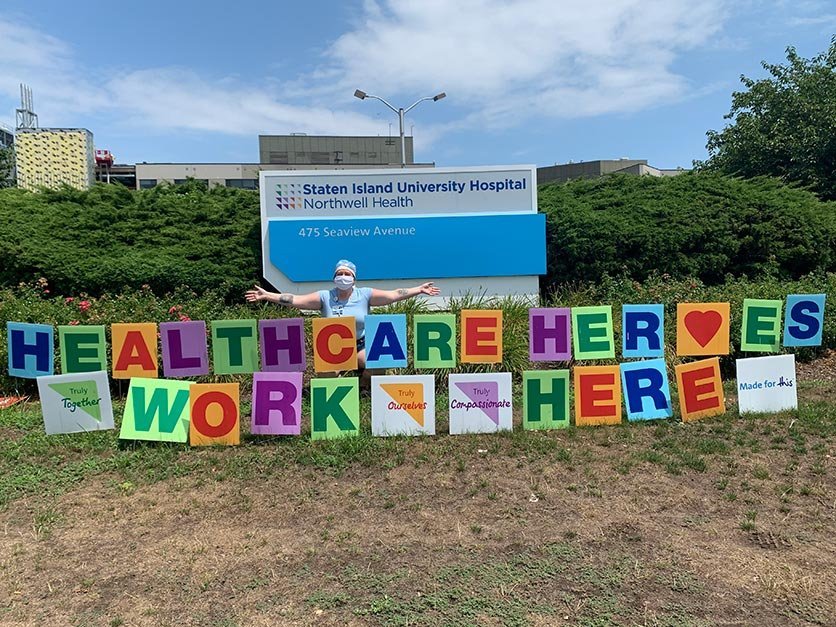
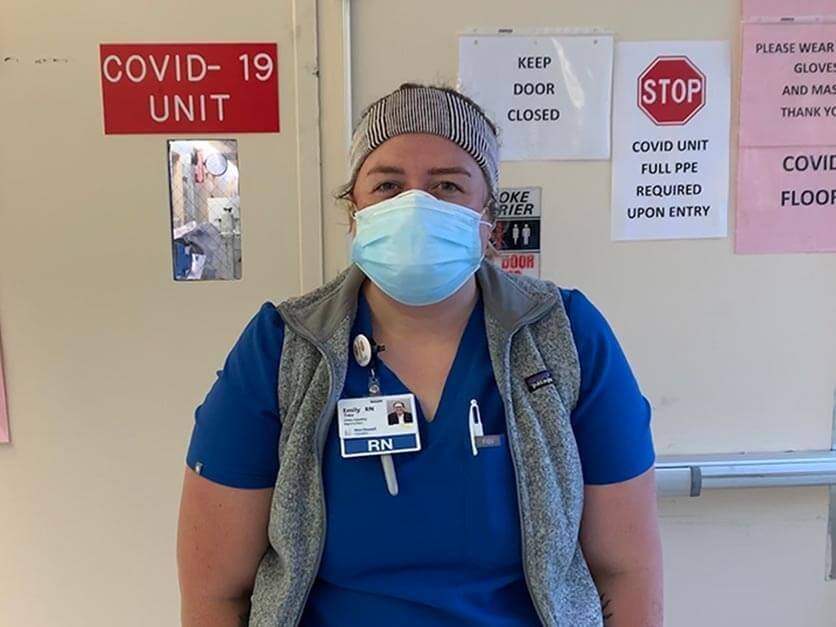
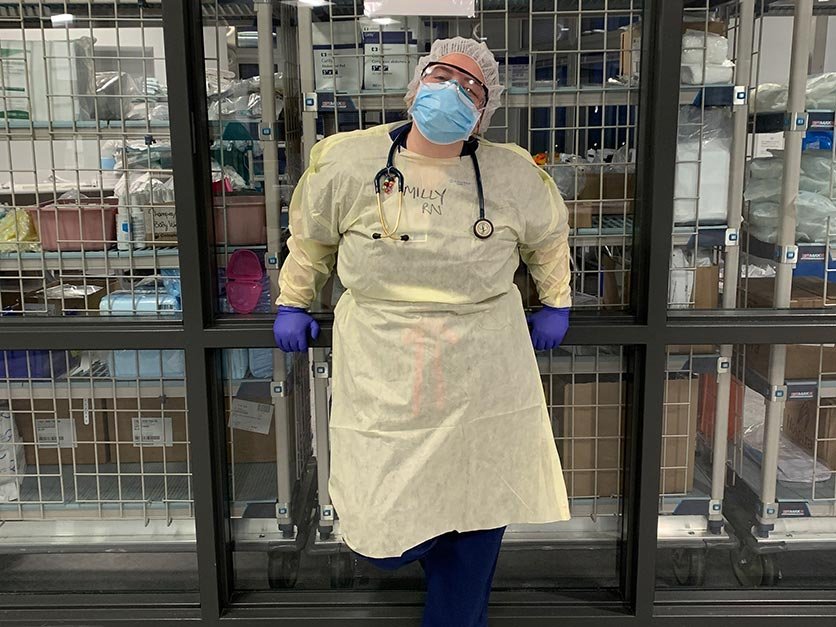
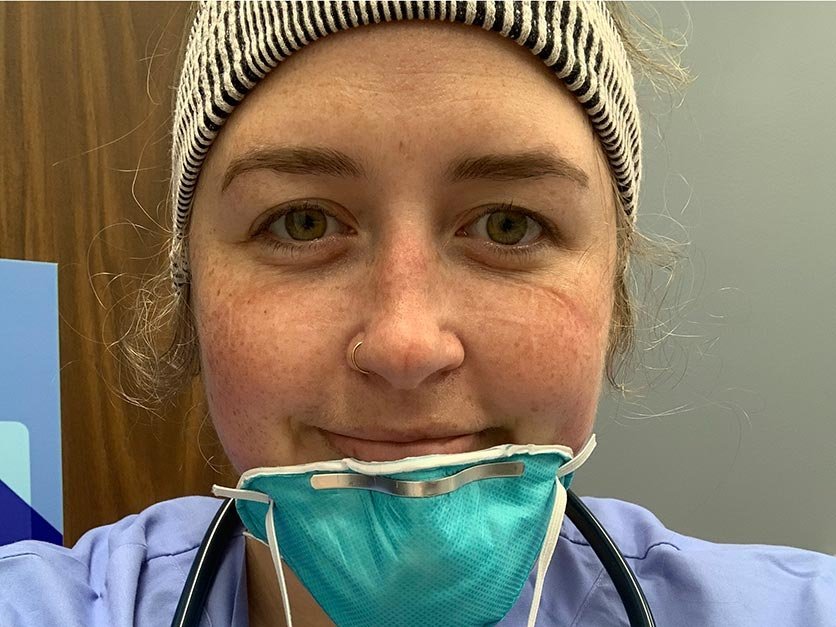
LR alumna Milly Treu had finished her contract in North Carolina when the COVID pandemic hit, and she felt called to help and volunteered to go to New York City.
Milly Treu wanted to feel the crunch of fresh powder. She was ready to have a pair of Nordic skis beneath her feet, a cool, cutting breeze in her face and the beautiful ranges of the Rocky Mountains before her eyes.
Providence had other plans.
With a calling to serve, Treu traded in her ski goggles for an N95 respirator mask, her snowsuit and skis for an isolation gown and face shield and her view of one of the world's most beautiful natural wonders for a front-row seat to the epicenter of the COVID-19 pandemic in America.
A travel nurse and 2016 graduate of Lenoir-Rhyne University, Treu was completing an assignment at Duke University Hospital when the world was rocked by coronavirus. She was planning on heading west for a contract in Colorado before deciding to change course.
"I just really felt a call from the Lord to go to New York," she said. "My initial instinct was that it seemed like too much, but He asked me to go. I had the time. I knew I could, so I drove on up a couple days after I finished my assignment in Durham."
A cardiac nurse by trade, Treu accepted a position at Staten Island University Hospital working in a new psychiatric facility that had its completion expedited and adapted to care for COVID-19 patients.
"Normally there are a lot of steps and a lot of hoops to jump through in order to get a New York license, but New York was in a state of survival and desperation," she said. "They told me, 'Just come, and we'll figure it out when you get here.'"
At the time of her arrival in New York City in mid-April, the state of New York had more confirmed cases of coronavirus than any nation on earth, according to CNBC, with more than 160,000 cases. That was more than China, Spain, France, Germany and Italy.
Five weeks into her contract, a hospital administrator pulled Treu and her colleagues aside to inform them the pop-up facility where she was working had treated more COVID patients than any facility in the state of New York. And their hospital system, Northwell Health, had treated more COVID patients than any system in the world.
"Milly's response to the pandemic represents the LR mission and our focus on true vocation and service to God and the world," said Dr. Michael McGee, dean of the College of Health Sciences at Lenoir-Rhyne. "During a chaotic time, Milly answered the call and provided a much needed service, while living her faith and providing an example for others."
Combating COVID
When working on a cardiac floor, Treu typically worked with heart transplant patients. Upon her arrival in New York, she adapted to helping patients on ventilators in respiratory distress.
"I honestly wasn't surprised I was moved to a COVID unit, but I was a little nervous," she said. "They took care of us though, and all of the nurses and staff were very safe."
While some sections of the country struggled to field proper personal protective equipment (PPE), Treu said that wasn't the case at Staten Island University Hospital.
"We didn't have any shortages of PPE," she said. "I wore PPE my entire shift. There was a donning area before we even stepped onto the unit. We had an N95 respirator mask and a regular mask. We wore gowns and eye protective wear. We called the first layer of gloves our skin, and we wore a second layer of gloves that we changed each time we came out of a patient's room."
Treu actually developed a bruise on her nose from constant PPE use, which she said didn't fully heal until the end of July, several weeks after her contract had ended.
She said her bosses ensured Treu and her fellow health care workers were not put in situations of undue risk. They were encouraged to take their full breaks, to get outside absent of respirator masks to breath fresh air and see the sun or stars.
Treu worked the 12-hour night shift three times a week. However, since she regularly interacted with COVID-19 patients, she largely spent the rest of her time in quarantine and offered to help with more shifts as needed.
"I couldn't imagine having gone anywhere else," she said. "It was really sweet to see people get better. That's the most unique part of my job, because I was not in the (Intensive Care Unit). I wasn't watching patients leave in body bags; I was watching them leave to go home. We had thousands of patients leave our facility, and we got to clap them out. It was surreal."
Of course, that response isn't surprising to those who know Treu.
"She's one of those people that always puts her heart out there," said Dr. Kerry Thompson, chair of the School of Nursing for Lenoir-Rhyne. "She's an excellent nurse, but she has a real compassion for people. She saw people who were suffering and thought if there was something she can do to help; she was going to try. I think she made a difference up there every day."
Each night as the news reports positive cases and increasing death tolls, a sense of dread has grown, but that hasn't reached Treu.
"When I first got to New York, almost every unit at Staten Island was a COVID unit," she said. "By the time I left, there were only two. The rest of the hospital was clean.
"On the news, we see the worst of the worst, but I got to see the best of the best. I got to see patients get better and go home. That was the best part."
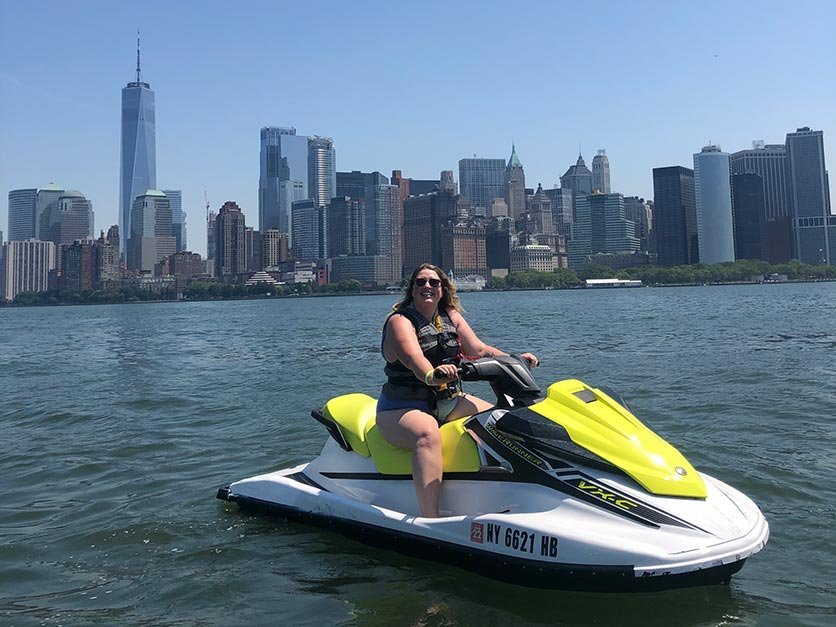
At the height of the pandemic, LR alumna Milly Treu volunteered to work in New York City when it had more COVID cases than all but five nations on earth.
Greer to Greenwich Village
Treu hails from Greer, South Carolina, a city of roughly 30,000. Two hours to the North, she received her training to become a nurse at Lenoir-Rhyne in the city of Hickory, population 40,000.
Moving to one of the most populous megacities on earth in the midst of a worldwide pandemic was an adjustment.
"The hardest part was being in New York City and not being able to do anything," she said. "I can find really fun things to do in even the most mundane cities. I'm only there for three months, but here I was in the city that never sleeps and no one could leave their home."
No Broadway. No trips to Central Park.
Treu said typically bustling tourist destinations and streets famous for bumper-to-bumper traffic were like ghost towns.
"I was really lucky to have met some community online," she said. "I was part of a virtual community group in Brooklyn. I didn't personally meet them until the end, but I felt like I had people there, as well as back home. I never once felt lonely or alone."
She received messages of encouragement from friends and family daily.
"While most people are running the other direction and not getting involved," Thompson said. "Milly was running toward it saying, 'I'll help.' To her, I think it was a calling to get involved.
"I'm very proud of Milly and all our Lenoir-Rhyne graduates out there on the front lines. I do worry about them, but I know they are prepared. I know they're using appropriate PPE, doing what they can to protect themselves and their families, but at the same time offering care to those individuals who are so in need right now."
When she wasn't working, Treu was been able to go for walks. She grabbed a slice of pizza from the restaurant that was in Spiderman 2, and she also rented a jet ski and drove right up to the Statue of Liberty.
"I'm so glad I did it," she said. "The people I met and the experience I had was life changing."
Treu said the day-to-day experience living in New York City was certainly different from that of North Carolina.
Since returning from the Big Apple, she said friends, former classmates and friends in the medical field have reached out for advice on how to combat the surge in cases that struck the rest of the country.
"In New York, restrictions were put in place and vigorously enforced," she said. "The lines outside stores had 6-foot spaces between people that was enforced. And the amount of people allowed in stores was enforced. When you think of New York, you think of really bad traffic and a lot of people, but the streets were practically empty.
"I do think because a lot of people didn't see the height and depth of how bad this virus is, there is a bit of a nonchalance. I literally put my hands on COVID patients. I had to lean in close to them; I couldn't keep 6-feet away. I wore my N95 mask and surgical mask, and I never got sick. I know that wearing masks works. It really does."
During her time in New York, Treu faced a momentous time in history. Despite a worldwide pandemic and nationwide protests, she thrived.
And she made it out unscathed.
"My advice would be to continue practicing social distancing," she said. "Wear your mask, and wash your hands. Continue to be patient with each other, love one another and we'll get through this."
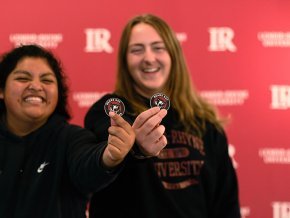
Lenoir-Rhyne celebrates the success of Giving Tuesday, an annual global giving movement for the causes and organizations we care most about.
View More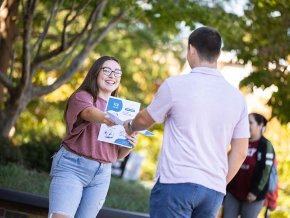
Public health major Jocelyn Florez '25 shares her passion for evaluation, prevention and protection as she does her part to build healthier communities.
View More